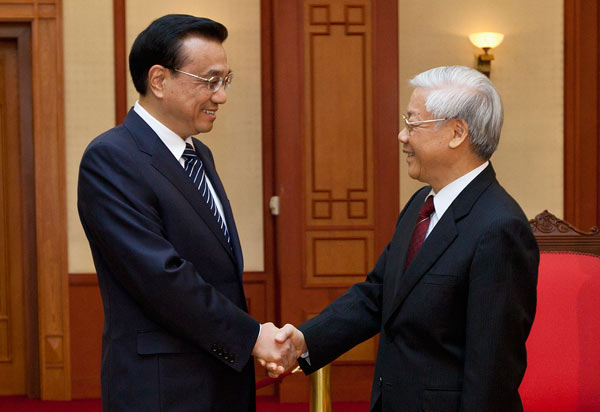Premier seeks talks over dispute
 0 Comment(s)
0 Comment(s) Print
Print E-mail China Daily, October 15, 2013
E-mail China Daily, October 15, 2013
 |
|
Premier Li Keqiang (left) shakes hands with Vietnamese General Secretary of the Communist Party Nguyen Phu Trong at the Party Central Committee Office in Hanoi on Monday. Li will return from his visit to Vietnam on Tuesday. |
Premier Li Keqiang said in Hanoi on Monday that peacefully handling the South China Sea issue matters in the big picture of economic cooperation between China and Vietnam.
Observers said Li has sent a clear signal during his three-day visit to Vietnam that bilateral negotiation is the "only worthy way" for resolving disputes, and worsening the situation will only harm the interests of Vietnam itself.
"Whether the South China Sea issue is properly handled or not is not only an emotional matter between the two peoples, but also a matter of politics and security circumstances for expanding large-scale cooperation, including infrastructure investment," Li told General Secretary of the Communist Party of Vietnam Nguyen Phu Trong.
Trong said Hanoi is willing to maintain frequent contact with Beijing, firmly support the relationship, and properly handle disputes to ensure the healthy, stable development of relations between the two countries.
When meeting with Vietnamese President Truong Tan Sang, Li said the two sides have the full capability and wisdom to overcome difficulty and "cement the basis of the two countries' shared interests".
Sang said Vietnam is "deeply satisfied" with the fruits of the Chinese premier's visit and has both the determination and confidence in effectively implementing the recently reached bilateral consensus — deepening the partnership simultaneously in maritime, onshore and financial cooperation.
The relationship between Vietnam and China has been overshadowed by maritime frictions in the South China Sea, but the two countries have made efforts to maintain frequent high-level exchanges this year.
The Vietnamese president, prime minister and deputy prime minister visited China earlier this year.
Qu Xing, president of the China Institute of International Studies, said Beijing has stressed unchanged emphasis on the relationship with Hanoi and recently Hanoi has delivered more positive signals and acted "more proactively" for improving the relationship.
The Chinese premier has seen a fruitful result during the trip, as he and his Vietnamese counterpart Nguyen Tan Dung told reporters after their talks on Sunday that the two countries will establish three working groups on maritime joint development, onshore infrastructure and financial cooperation.
Regarding onshore cooperation, the two countries need to improve strategic planning with the establishment of a work group on infrastructure cooperation, and promote practical cooperation in such areas as interconnectivity, trade and investment.
On the financial front, the joint work group on financial cooperation should lead the two to signing a bilateral currency swap deal and a local currency settlement agreement, so as to help safeguard the economic development and financial stability of both countries and the region at large.
Wu Shicun, head of the National Institute of South China Sea Studies, said Li's trip was made to boost mutual trust and demonstrate consensus that the two neighbors are breaking ground in economic cooperation.
Given lessons learned from the Asian financial crisis in the 1990s, both countries vowed to build a financial security network to fend off potential risks to their economic stability.
China's economic role will not be ignored by Hanoi because China is Vietnam's "largest trade partner", and China's increased investment is particularly helpful at a time when the Vietnamese economy is suffering turbulence, Wu said.
In the first half of 2013, total bilateral trade reached $23 billion, an increase of 19.7 percent over the same period last year, according to the Vietnamese Foreign Ministry.
"China has been among the top 15 out of 101 countries and territories investing in Vietnam with a total of 933 investment projects and a registered capital value of $4.79 billion," Vietnamese Foreign Minister Pham Binh Minh told China Daily before Li's visit.
Every year, some 3 million tourists travel between the two countries, and many key projects are ongoing for the 2012-16 period, Minh said.
Vietnam's location on China's border is also a geopolitical advantage for further tapping into the full potential of the connectivity projects, Qu Xing said.
The Chinese premier said he and Dung believed the common interests and consensus between the two countries far outweigh their disputes and differences.
"We agreed that we should place priority on economy and livelihood so that both economies will consistently develop and prosper to ensure our citizens a good quality of life," Li said.





